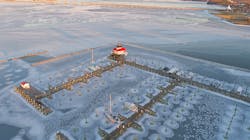Maryland Revises Discharge Permit for Embattled Development
The Maryland Department of the Environment (MDE) has revised a discharge permit for a proposed land development for expansion of a Trappe, Maryland.
Residents and environmental activists raised environmental concerns over the 2,500-home development, which would drastically increase the population of the 1,000-population community, due to the proposal of spraying treated wastewater on nearby farms, rather than discharge into local waterways due to nutrient limitations as the local waterway is connected to the Choptank River.
According to the Bay Journal, those opposing this method of wastewater disposal claimed the land application would leach into the ground and contaminate groundwater. The original discharge permit allowed for 540,000 gallons per day, but the revision from MDE allows for considerably less flow.
“On Oct. 27, MDE, citing the public comments it had received, declared it would permit spraying of only 100,000 gallons of wastewater daily — limiting the Lakeside development to building just 400 homes for now. The agency also ordered groundwater monitoring and set additional conditions on the spraying.” – Bay Journal Report
According to a report from the Star Democrat, mentions of future growth and expansion were removed in this revision as well, meaning that future expansions due to growth will require a new discharge permit.
Matt Pluta, an opponent of the development and director of riverkeeper programs for ShoreRivers, told the Star Democrat he was happy to see the impact of public comment, but still raised issue over spraying wastewater on farm fields.
“As we told MDE in our initial comments, spray irrigation is not an adequate means of disposing wastewater without polluting the river,” Pluta said to the Star Democrat. “The intention of these permits is for wastewater sprayed onto fields to be absorbed by crops, but much of the nutrients end up percolating into our groundwater instead.”
In a statement to the Bay Journal, MDE Spokesperson Jay Apperson said public participation in matters like this is “crucial.”
“In this instance, after careful consideration of the public comments received, MDE issued a science-based permit that placed further limits on when, where and under what conditions spray irrigation can take place, among other changes,” Apperson said to the Bay Journal.
The development is already under construction, and the Bay Journal reported the wastewater from 120 homes on site is being collected by an already existing treatment plant. As the development expands, however, MDE has indicated the wastewater must flow to the new treatment plant, which has better nutrient removal systems. Construction is expected to finish in 18 months, despite an ongoing lawsuit brought against the development in May by Trappe residents.
